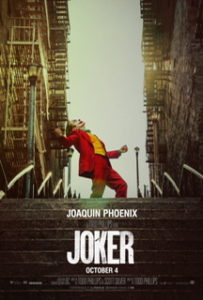In a society that is dominated by pop-culture, an entertainment industry that is ruled by action-packed formulaic superhero blockbusters, and an era that prioritizes progress over civility, it’s refreshing to watch a movie as bold, stylistic, and uncomfortable as Joker. As much as I love movies like Avengers: Endgame, Deadpool, The Dark Knight, and others of the like, there has always been a sinking feeling in every viewing that the comic-book movie genre has never tapped into its true potential. Call it a fad or a phenomenon, billions of people from every imaginable demographic watch superhero movies every year, making it one of the most successful and accessible genres in cinema history. And yet, Joker might be the first one to have a premise conceived outside our collective comfort zone while simultaneously being executed to near-perfection.

Director Todd Phillips is responsible for a masterpiece in every sense of the word. Formally, Joker is more comparable to Oscar-winning indie movies than it is to superhero movies. Everything from the cinematography, score, and especially the leading performance set this film above the rest from a critical stand-point. Even without its incredibly impressive technical achievements, Joker is a formal triumph based on Joaquin Phoenix’s take on the Joker alone. From the very first scene, Phoenix is Arthur Fleck/the Joker. There is not one frame in which I question the character’s realism or actor’s commitment to the role. Selling a new interpretation of the Joker – one of fiction’s most iconic villains – seemed impossible to accomplish after Heath Ledger’s game-changing performance in Christopher Nolan’s The Dark Knight. Keeping in mind that Ledger didn’t have the same opportunity to shine as he was only the villain in someone else’s story, and despite the fact that his performance is still one of cinema’s greatest, I have to say that Joaquin Phoenix’s just might be better. Thanks to him, Phillips delivers an in-depth character study of a comic-book madman that is so grounded in reality, it’s frightening. As we watch Arthur transition from pitiful loser to irredeemable murderer, we almost become accomplices to his crimes. Of course, we never condone them. That’s out of the question. But, unlike past interpretations of the Joker, we understand why this one does what he does.

So far, it seems the main criticism with Joker shared by critics and audiences is that it is simply too much to stomach. Unlike most blockbuster movies, this film is not designed to appeal to everyone. Although in every technical sense, this movie is about as spotless as they come, its boldness borders on gratuitous. I understand people bringing up ethical questions surrounding this movie. Just like mediums such as the extremely controversial Netflix series, Thirteen Reasons Why, it is possible that if the wrong person sees it and takes away the wrong message, it could be disastrous. Personally, I don’t agree with these criticisms. After several days of conflicted reflection on this movie, I believe that it offers a strong stance on the mental health crisis in America and does so without romanticizing the illness or scapegoating its victims. It shows a worst-case-scenario for the underprivileged, often ignored and forgotten population of Americans who need help. To some, Joker might be too confident in its take on this topic. To others, it might be comforting to see blockbuster film tackle real-life problems. Because, in this movie, the big bad isn’t some giant genocidal purple man or even some delusional clown…it’s society and the restraints placed upon people who are so easily overshadowed because their issues are hard to stomach. As is our complicity in them. Overall, Joker is unlike any other film in the comic-book movie genre, featuring the best performance of the year (at least) and accompanied by outstanding formal feats and disturbing themes. Despite the uncomfortable aftertaste I had walking out of the theater, I’m glad this movie exists and hopeful that it will not only advance the world-dominating superhero genre, but our own national discussions on these serious issues. But if you are going to buy a ticket, you should know what to expect. Because, in the end, you get what you paid for.
